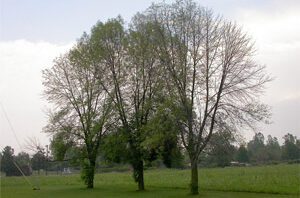Dupont's new systemic herbicides, designed to keep turf grass free of troublesome weeds, seem to pose little direct danger to human health. But it turns out they do kill trees.
After receiving more than 7,000 reports of damaged or killed trees in states throughout the midwest, last week EPA ordered Dupont to immediately "halt the sale, use or distribution" of the company's herbicide Imprelis.
EPA approved conditional registration of Imprelis in August 2010. New York and California chose not to register the herbicide because tests showed it failed to bind with soil, "raising a red flag for potentially contaminating groundwater and damaging non-target plants," according to BioCycle Magazine.
BioCycle also reports that a national law firm has organized a class action lawsuit targeting Dupont on behalf of homeowners in Ohio, Michigan, Indiana, Iowa, and Minnesota whose trees have been damaged or killed. Plans are underway for additional legal actions in Wisconsin, Illinois, Kansas and South Dakota.
Norway spruce and white pine appear to be particularly susceptible to harm from the longlasting herbicide.
Imprelis is one of dozens of Dupont products with the active ingredient aminocyclopyrachlor, most designed for use on turf grass or roadside brush control. All other products in this family, including the herbicides Perspective, Plainview, Streamline and Viewpoint, are still on the market.
Growing trouble with herbicides
Last week's action by EPA and the pending lawsuits — with billions in potential liability — come on the heels of Dupont's losses in a lawsuit around damage caused by the company's herbicide Oust. Another longlasting, water-soluble herbicide (active ingredient: sulfometuron methyl), Oust was used by the Bureau of Land Management back in 2001 to control invasive weeds on more than 30,000 acres of public rangeland in Idaho.
When the wind came, the herbicide was carried in dust onto more than 100 neighboring farms. Sugar beets wilted, corn was stunted and potatoes died; after years of crop failure, farmers suffered millions in losses, and some lost their land to creditors.
One of the attorneys in the case described the herbicide as "very potent," known to hurt crops in concentrations as low as parts-per-trillion.
In a 2009 trial involving just 4 of the 118 farmers who have filed suit, a jury ordered Dupont to pay $17.8 million in damages, finding the company "responsible for selling a product that was defective, unreasonably dangerous and lacking adequate warnings" according to coverage in the MagicValley Times-News.
Dupont has appealed the ruling, and the 114 other cases remain to be heard. Between dying trees and damaged crops, Dupont's herbicides seem to be keeping the company lawyers very busy.







